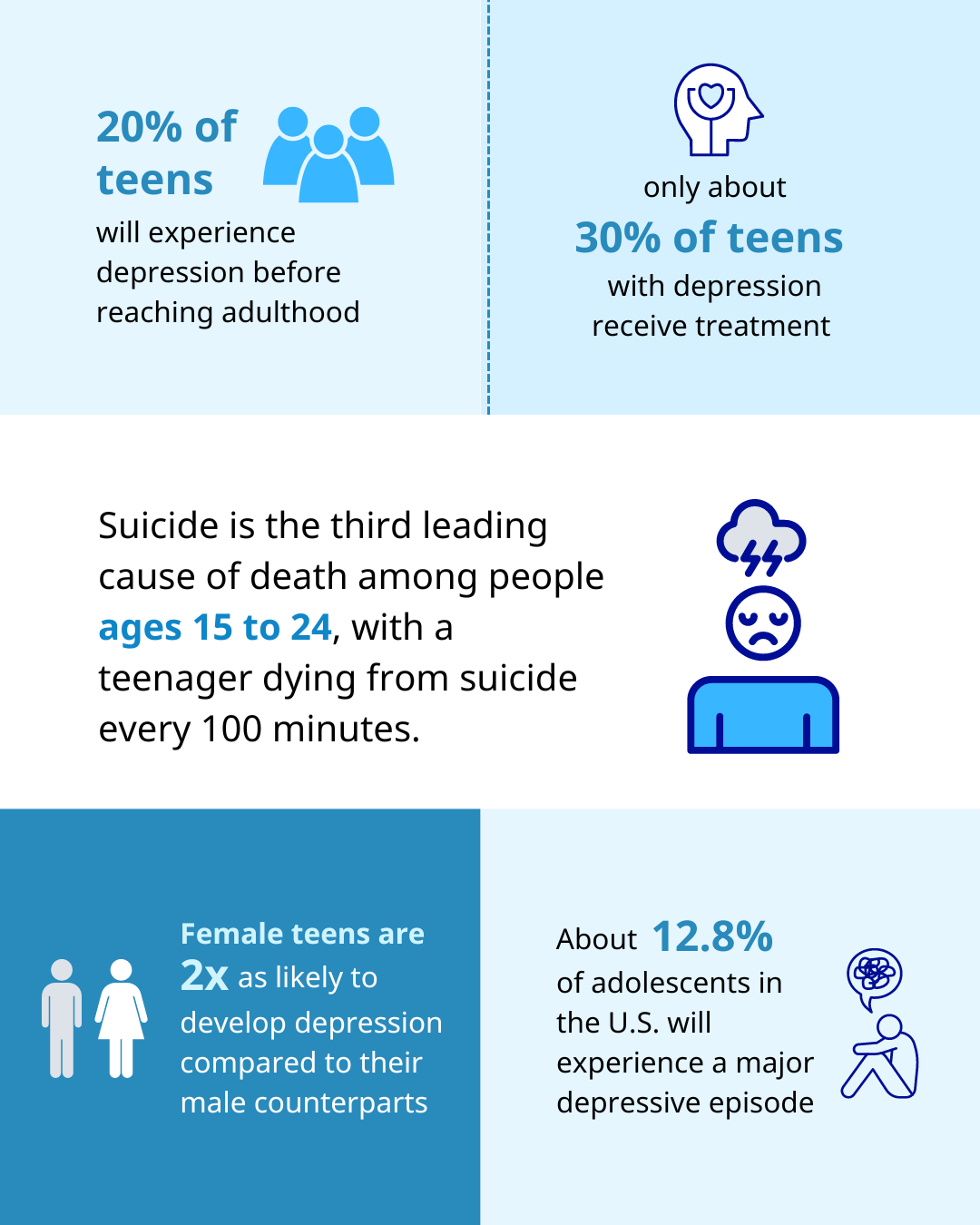According to the National Institute of Mental Health, about 3.2 million teens in the United States experience depression each year. Alarmingly, without prompt and effective treatment, approximately 20% of these teens may attempt suicide. For the latest statistics and updates, visit the National Institute of Mental Health’s website.
As parents, it is crucial to be aware of the signs and symptoms of teenage depression and take action to support your child’s mental health.
Parenting is not easy. You are juggling careers, relationships, and other responsibilities while trying to raise happy and healthy children. This article provides essential insights into teenage depression, including causes, symptoms, and effective treatments. Learn how online therapy can support your child and how to recognize the warning signs of teen depression. We understand the challenges of parenting and want to support you in navigating through this challenging aspect.
What is teen depression?
Being a teenager is a unique phase in life filled with changes and challenges. It’s common to experience ups and downs throughout this period due to how big of a jump from pre-teen to teenager can be.
Some of those ups and downs come with strong feelings, which can be a regular part of the growing process. The issue of depression arises if feelings of sadness persist and interfere with daily life for more than two weeks.
Key facts about teen depression:
- Prevalence: 20% of teens will experience depression before adulthood.
- Treatment gap: Only about 30% of teens with depression receive treatment.
- Suicide risk: Suicide is the third leading cause of death among individuals aged 15 to 24, with a teen taking their life every 100 minutes.

As you can see, a significant number of teenagers will experience depression before adulthood, and most of them do not receive treatment. With the clear link between teenage depression and suicide, this is a mental health crisis that needs immediate attention.
Why does teen depression happen?
Understanding why teen depression happens can be difficult because the causation is different for each person and potentially stems from multiple areas.
Some causes of teen depression include:
- Academic pressure: Concerns about school performance and feelings of inadequacy can contribute to depression.
- Social challenges: Peer relationships, social status, feeling accepted, or bullying incidents can significantly impact emotional health.
- Family dynamics: Family life and relationships within the household can influence feelings of depression. If the environment at home is chaotic, unstable, or unpredictable, depressive feelings can surface.
- Environmental stress: External stressors, such as traumatic events or environmental factors, can trigger depression.
It’s essential to remember that depression can affect teenagers from all backgrounds. If persistent sadness continues despite efforts to engage in enjoyable activities or connect with friends and family, seeking professional help is a wise choice.

Can teen depression run in families?
Yes, depression can have a genetic component, and adolescents with a family history of depression may be more susceptible to the condition. Understanding your family’s mental health history can provide insights into your risk factors for depression.
According to Stanford University research, “If someone has a parent or sibling with major depression, that person probably has a 2 or 3 times greater risk of developing depression compared with the average person (or around 20-30% instead of 10%).”
Genetics is not the only contributing factor to depression. It is wise to take note of if there is a familial connection to this condition because a known genetic link to depression can help explain your child’s potential predisposition to it.
What are the common symptoms of teen depression?
Recognizing the symptoms of teen depression is vital for early intervention. Not every teen will experience depressive symptoms. Look for abnormal behavior that drastically affects their daily life.
Some symptoms of teen depression include:
- persistent sadness: Feeling sad or hopeless most of the time, even without an apparent reason.
- loss of interest: No longer enjoying activities or hobbies they used to love.
- sleep changes: Alterations in sleep patterns, such as excessive sleep or insomnia.
- eating habits: Significant changes in eating habits that lead to weight gain or loss.
- behavioral changes: Irresponsible behavior, skipping school, and difficulties with decision-making.
- physical complaints: Frequent physical complaints like headaches, stomachaches, or fatigue.
- guilt and shame: Experiencing excessive or inappropriate guilt and shame.
- social withdrawal: Avoiding social situations, withdrawing from friends, and feeling isolated.
- preoccupation with death: Thoughts or discussions about death and dying.
- risky behaviors: Engaging in risky activities like substance use or risky sexual behavior.
Teen depression often coexists with other mental health conditions, such as anxiety. Therefore, it’s essential to address these symptoms promptly to understand the complete picture of the symptoms and conditions your teen is experiencing.
How is teen depression diagnosed?
Screening for depression and related conditions in adolescents has become increasingly important. The United States Preventive Service Task Force recommends screening for anxiety in children and adolescents aged 8 to 18 and for major depressive disorder (MDD) in adolescents aged 12 to 18.
Diagnosing teen depression involves comprehensive assessments and interviews conducted by healthcare professionals. These evaluations may include discussions with the teenager and possibly family members, like parents or guardians.
The severity of depression and the risk of suicide are determined through these assessments, with treatment recommendations tailored to individual needs.

What are the most effective treatments for teen depression?
Effective treatment options for teen depression include online therapy, which offers a convenient and accessible way for teens to receive help from the comfort of their homes. Online therapy, combined with other supportive measures like cognitive-behavioral therapy (CBT), has shown significant benefits in managing and alleviating depression symptoms. Explore how online therapy can be tailored to meet your teen’s needs.
- Psychotherapy: Different forms of psychotherapy, such as cognitive-behavioral therapy (CBT), can help teenagers recognize and manage negative thought patterns. Family therapy may also be beneficial, mainly when family conflicts contribute to depression.
- Supportive environment: Adolescents need a safe support system from their family, friends, and teachers to help with school or peer-related problems. It takes courage to discuss thoughts and feelings, and having that safety net of loved ones to soothe and help your teen navigate treatment is vital to symptom management.
- Combination treatment: A combination of online therapy and other supportive measures, like medication or multiple therapy types, has shown promising results in relieving teen depression. Your counselor can discuss the types of treatment that could most benefit your teenager after evaluation and diagnosis.
Research supports the effectiveness of online therapy in alleviating symptoms in adolescents. Combination treatment, involving online therapy and support, is particularly beneficial.
What are the warning signs for teen suicide?
Teen depression carries a high risk of suicide, making it crucial to be aware of warning signs and act as soon as you see them.
Some warning signs of teen depression that require immediate action include:
- expressing hopelessness for the future.
- giving up on themselves
- feeling as if no one cares.
- preparing for death, such as giving away possessions or writing goodbye letters.
- defiant behavior and violent tendencies.
- threatening to or talking about committing suicide.
If your teenager displays any of these behaviors, seek immediate help from a mental health professional, or a suicide hotline, or take your child directly to an emergency room so they can get the immediate help and safety measures they desperately need.
What are the 7 ways parents can help?
Even though coping with teen depression can be challenging, there are steps parents can take to help support their teenager navigate through it:
- Replace shame with positive reinforcement: When disciplining your teen, focus on positive reinforcement for good behavior rather than shame and punishment.
- Allow mistakes: Let your teenager make mistakes and learn from them. Over-protection can undermine their confidence.
- Give space: Allow your teen room to grow and make decisions independently. This fosters confidence and self-compassion.
- Avoid reliving your youth: Don’t impose your experiences and expectations on your teenager’s activities and choices.
- Listen actively: If you suspect your teen is depressed, listen to their concerns attentively.
- Open communication: Encourage open dialogue, even if your teen seems withdrawn.
- Seek professional help: If you feel overwhelmed or unable to reach your teen, consult a Makin Wellness online counselor who specializes in teen depression for guidance. By receiving online counseling, you can understand how you can be helpful and potentially any behaviors you may unknowingly be exhibiting that could contribute to your teenage depression.
As a parent, it may be difficult to hear that certain ways you parent your children may be contributing to your child’s depression. The reality is that even if you parent “perfectly” — which doesn’t exist, there is no perfect way to parent — each child absorbs words, actions, and situations differently.
Understanding how your parenting affects your child does not mean you are a terrible parent. It shows a different light on how your child sees the world and anything that can contribute to it, good or bad.
Knowing how you contribute to that worldview may unlock details that can significantly help your child recover from depressive symptoms and strengthen your bond in the process. Think of it as a piece of the puzzle to relieving depressive symptoms. Any bit helps to see the clear picture in the end.

What can teenagers do to help with their symptoms?
When you feel depressive symptoms, you may feel no energy or desire to do anything. These are a few things that can significantly impact the severity of depressive symptoms, focusing on understanding your feelings and connecting with others.
- Understand what you are feeling: Identify recurring thoughts and feelings you experience. Write them down and think about what may be causing you to think that way. Ask yourself, “Is this true, or is this depression talking?” Knowing what you feel and why you may feel it helps you know what thoughts to hold on to and believe.
- When you feel down, lean on others: Reach out to trusted friends, family members, or teachers who can provide emotional support. It is okay to feel down and share those feelings with others. Isolating yourself is only going to intensify your thoughts and feelings. Connecting with people you love and care about is proven to help lift the heaviness of the feelings you are experiencing over time.
- Talk to a counselor: If you believe you are experiencing depression, talk with your parent or guardian about getting counseling services. A qualified counselor can help you understand why you are feeling what you feel and devise a plan with coping skills to help manage the severity and occurrence of those symptoms.
Conclusion
Teenage depression is a serious condition that demands timely intervention to prevent its potentially devastating effects. As a parent, your role is crucial in supporting your teen through these challenging times. Let them know they are not alone and encourage them to seek help. Makin Wellness is here to provide expert online therapy tailored to your teen’s needs.
Ready to take the first step? Contact us at (833)-274-heal or schedule an appointment online with one of our specialized counselors. Let’s work together to help your teen achieve a brighter future.
More resources:
Depression Quiz: 12 Questions To Discover “Do I Need Help?”
What Does Depression Feel Like? 7 Real-Life Examples + 5 Ways to Stop depression=-
Client testimonial










This Post Has 5 Comments
It’s so frustrating how no matter how many times I try to explain to my mom that I’m a moody teen because of some of these reasons (depression, adhd, confusion, bullying, LITERALLY EVERYTHING A NORMAL FUCKING TEEN GOES THROUGH?!), and she STILL yells at me and manipulates me into saying sorry to her when it should really be the other way around. She always threatens to take away my internet privileges, which is absurd considering school’s ending and I only have 3 IRL friends (one being my girlfriend), and majority of the people I trust and love talking with are online, so taking away my connection with those people is just going to make me more miserable, especially considering the fact I’ve had suicidal thoughts & practiced SH in the past. It’s hilarious to me how she thinks she’s the reason I haven’t actually killed myself yet, when really it’s my biological mom, my online friends, my 3 IRL friends, and my two cousins (one being a toddler who I really want to see grow up). My other cousin lives far away and we don’t even talk all that much, so the fact I’m more willing to live for her than my own mother just makes me laugh.
Hi Jay. Thanks for sharing your story. We understand that how you feel is real. However, we have found that finding someone you can talk to and process these things with goes a long way. If you ever feel this could help you contact our Makin Wellness team, we’re here to help.
I thought you made a good point when you mentioned that counseling can be a good support system when it comes to helping teenagers that are miserable. I would think that it could be a good idea to send troubled teenagers to some kind of youth ranch that helps with these issues. This kind of youth ranch seems like a good way for a teenager in this kind of situation to get some much-needed healing.
Teen depression is something that’s eating our society right now. It’s a silent one, that we won’t even know that young people are suffering from it. I love that you share this piece as it also spread awareness to everyone. Depression is something that’s often hiding away from the smiles of person around you.
Hello, thank you for your feedback on this article!